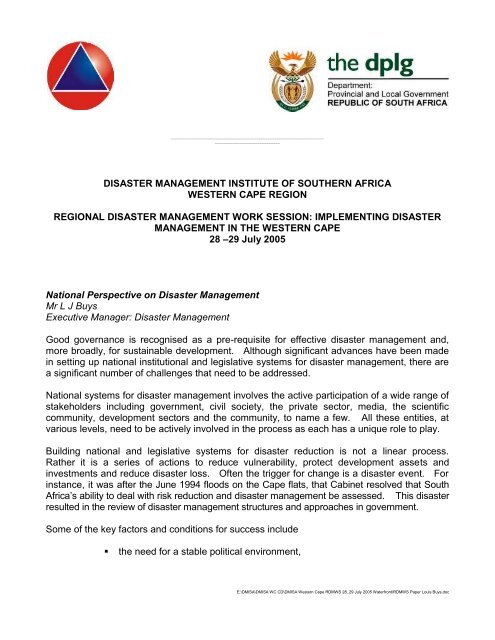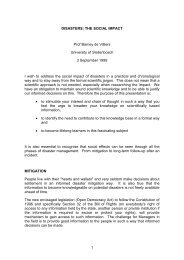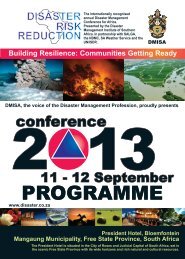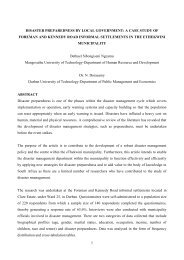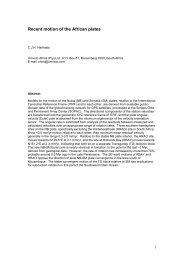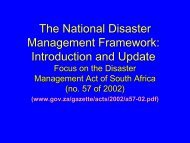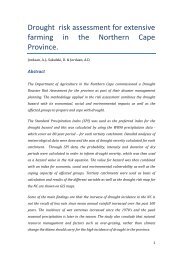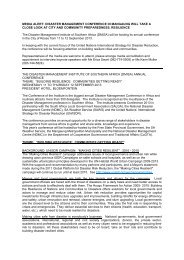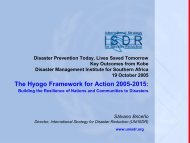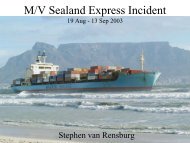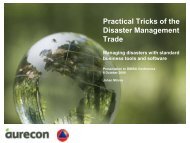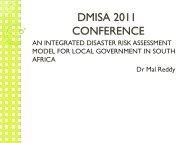Louis Buys - Disaster Management Institute South Africa
Louis Buys - Disaster Management Institute South Africa
Louis Buys - Disaster Management Institute South Africa
You also want an ePaper? Increase the reach of your titles
YUMPU automatically turns print PDFs into web optimized ePapers that Google loves.
____________________________________________________________________<br />
_____________________________<br />
DISASTER MANAGEMENT INSTITUTE OF SOUTHERN AFRICA<br />
WESTERN CAPE REGION<br />
REGIONAL DISASTER MANAGEMENT WORK SESSION: IMPLEMENTING DISASTER<br />
MANAGEMENT IN THE WESTERN CAPE<br />
28 –29 July 2005<br />
National Perspective on <strong>Disaster</strong> <strong>Management</strong><br />
Mr L J <strong>Buys</strong><br />
Executive Manager: <strong>Disaster</strong> <strong>Management</strong><br />
Good governance is recognised as a pre-requisite for effective disaster management and,<br />
more broadly, for sustainable development. Although significant advances have been made<br />
in setting up national institutional and legislative systems for disaster management, there are<br />
a significant number of challenges that need to be addressed.<br />
National systems for disaster management involves the active participation of a wide range of<br />
stakeholders including government, civil society, the private sector, media, the scientific<br />
community, development sectors and the community, to name a few. All these entities, at<br />
various levels, need to be actively involved in the process as each has a unique role to play.<br />
Building national and legislative systems for disaster reduction is not a linear process.<br />
Rather it is a series of actions to reduce vulnerability, protect development assets and<br />
investments and reduce disaster loss. Often the trigger for change is a disaster event. For<br />
instance, it was after the June 1994 floods on the Cape flats, that Cabinet resolved that <strong>South</strong><br />
<strong>Africa</strong>’s ability to deal with risk reduction and disaster management be assessed. This disaster<br />
resulted in the review of disaster management structures and approaches in government.<br />
Some of the key factors and conditions for success include<br />
• the need for a stable political environment,<br />
E:\DMISA\DMISA WC CD\DMISA Western Cape RDMWS 28_29 July 2005 Waterfront\RDMWS Paper <strong>Louis</strong> <strong>Buys</strong>.doc
2<br />
• the presence of an explicit national disaster strategy,<br />
• the adoption of multi-hazard approaches,<br />
• multi-stakeholder engagement,<br />
• private sector involvement,<br />
• risk assessment data as the basis for stakeholder engagement dialogue,<br />
• decentralised approaches,<br />
• participatory monitoring,<br />
• integration of risk into development,<br />
• financial instruments for disaster risk management,<br />
• media involvement,<br />
• sustained commitment on the part of policy makers, and<br />
• a long-term perspective.<br />
Taking advantage of the window of opportunity, often created by a disaster, to make<br />
investments in prevention also contributes to the advancement of a more comprehensive<br />
approach to and generating a demand for disaster risk management measures.<br />
One of the major challenges that national government encountered during the process of<br />
establishing effective legislative, institutional frameworks and systems for risk reduction, was<br />
how to make disaster risk reduction a major policy issue.<br />
It is always difficult to engage policy makers in a dialogue on reducing disasters and the<br />
social and economic benefits of investing in this when the benefits are not always obvious or<br />
immediate.<br />
To this day the focus is still heavily weighted to disaster response and not on prevention and<br />
risk reduction.<br />
Reaching those most at risk is also difficult since they are often more focused on meeting the<br />
challenges of daily chronic risk, not disaster risk or sustainable development, and this<br />
perspective is difficult to modify.<br />
E:\DMISA\DMISA WC CD\DMISA Western Cape RDMWS 28_29 July 2005 Waterfront\RDMWS Paper <strong>Louis</strong> <strong>Buys</strong>.doc
3<br />
There has been an increase in the number of natural disasters over the past years, and with<br />
it, increasing losses on account of urbanisation and population growth, as a result the impact<br />
of natural disasters is now felt to a larger extent. The approximate financial impact of natural<br />
disasters during the period 1999 – 2003 was more than R8,7 billion. This amount has<br />
increased drastically due to the current drought in the country.<br />
Policy changes as far as disaster management is concerned have however, changed<br />
dramatically over the past seven (7) years in an attempt to break the downward spiral of<br />
impoverishment. We are one of the first countries in the world to embark on an all inclusive<br />
consultative process of addressing disaster management –<br />
The Green Paper on <strong>Disaster</strong> <strong>Management</strong> was officially launched in 1998.<br />
The White Paper on <strong>Disaster</strong> <strong>Management</strong> was launched in 2000.<br />
The <strong>Disaster</strong> <strong>Management</strong> Act, 2002 (Act No. 57 of 2002) was promulgated on 15<br />
January 2003 and commenced on 1 April 2004 as far as the national and provincial<br />
governments are concerned and 1 July 2004 in respect of the local government<br />
sphere.<br />
The National <strong>Disaster</strong> <strong>Management</strong> Framework was published on 29 April 2005.<br />
<br />
The Inter-governmental Committee on <strong>Disaster</strong> <strong>Management</strong> (ICDM) was<br />
established by the President on 27 June 2005.<br />
The dynamics of disaster management at the local, provincial and national levels should be<br />
built through strong advocacy design and supported by continuous management and<br />
distribution of information.<br />
A national government has the sovereign right and responsibility to issue timely warnings<br />
when it is determined, through scientific and other expert means that segments of its<br />
population are at risk. It is when no authoritative source of information exists that persons<br />
may act on incorrect or misleading information that can lead to confusion and loss of life and<br />
livelihood.<br />
In reviewing the function of early warning systems and gathering of information it is<br />
recognised that this is a process and not a single activity, and that participants in the process<br />
must include a broad, cross-section of society. Although the diversity of this participation<br />
should be considered positive, frequently national and local coordination of these processes<br />
is not always adequate. The prediction and monitoring of hazards require access to<br />
infrastructure and expertise that is not universally shared or accessible to all communities that<br />
may be vulnerable.<br />
E:\DMISA\DMISA WC CD\DMISA Western Cape RDMWS 28_29 July 2005 Waterfront\RDMWS Paper <strong>Louis</strong> <strong>Buys</strong>.doc
4<br />
From a national perspective it is clear that we have made tremendous progress in<br />
establishing a policy or code of conduct that manages the involvement and performance of all<br />
stakeholders in terms of disaster management.<br />
Two-day workshops were held in every province from 6 June to 8 July 2005 to discuss the<br />
National <strong>Disaster</strong> <strong>Management</strong> Framework and implementation strategy. These workshops<br />
proved to be very successful and provided a great opportunity to clear up any remaining<br />
uncertainties regarding our respective roles in disaster management.<br />
A National Workshop was held on 19 and 20 July 2005 to which all national government<br />
departments and relevant government entities were invited. The purpose of this workshop<br />
was once again to ensure that all stakeholders were made aware of their roles and functions<br />
in respect of disaster management as provided for in the <strong>Disaster</strong> <strong>Management</strong> Act.<br />
From a national perspective therefore, I am satisfied that we are succeeding in creating a<br />
paradigm shift from a response oriented culture to one of prevention and mitigation.<br />
The remaining challenge is related to sustaining participation and benefits once they have<br />
been created.<br />
Thank you.<br />
E:\DMISA\DMISA WC CD\DMISA Western Cape RDMWS 28_29 July 2005 Waterfront\RDMWS Paper <strong>Louis</strong> <strong>Buys</strong>.doc


